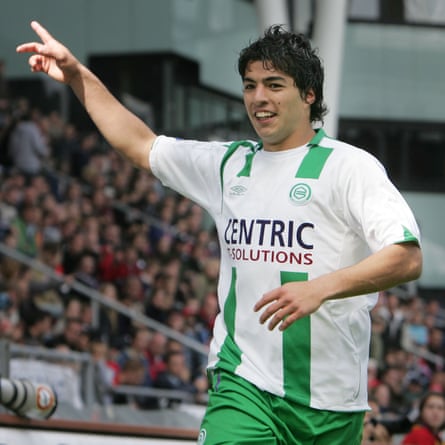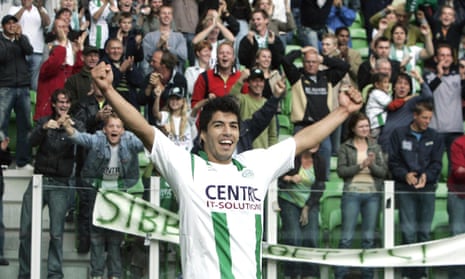The humble umbrella has proven itself more foe than friend to football managers. The game’s umbrella-related history is short and sour, with Steve McClaren, who stood isolated and forlorn under an official FA golf umbrella, and the likeable Dutch coach Ron Jans, providing notable episodes.
In September 2006, Jans’ team, FC Groningen, were trailing Partizan Belgrade 4-2 after their Uefa Cup first round first leg. Throughout the return leg, showers lashed rain upon the compact Euroborg Stadion. The persistently chipper manager stood defiantly under a modest green umbrella. On the field, a 19-year-old with slick black hair was proving Jans’ biggest gamble, and Partizan’s biggest thorn.
Luis Suárez, a blur of now familiar bustle and poise, won Groningen a penalty just after the hour mark. Jans looked on, his aura positive and his suit relatively dry, as Koen van der Laak duly despatched the penalty. Groningen’s fans hit fever pitch. It was their first European campaign in a decade and they were in the ascendency. With half an hour to play, Groningen had to score one more goal to win the tie against their much-fancied opposition.
Almost inexplicably, Jans substituted the lively Suárez two minutes after the restart. Despite his tender years and lack of ability in English and Dutch, Suárez wasn’t shy about showing his anger. He stormed past Jans, furiously waved away the offer of a hand and launched a tirade of expletive-laden Spanish at his manager. Not shy of showing some emotion himself, Jans responded angrily and theatrically, throwing his umbrella to the ground. It smashed upon impact, breaking in two.
Back on the field, the rain persisted but a second Groningen goal proved elusive. Without his umbrella, Jans was soaked through. As for his relationship with Suárez, that old Dutch saying rang true: na regen komt zonneschijn (after the rain comes the sunshine).
Though Suárez and his show of petulance had upset many, Jans was quick to clear the air. Just three days later, an Eredivisie fixture with Vitesse Arnhem offered a shot at redemption.
Suárez was industrious and exuberant against Vitesse but, after 80 minutes, Groningen trailed 3-1. In the 82nd minute he won his team a penalty, which was again converted by Van der Laak. Suárez equalised five minutes later. Three minutes after that, now deep into the desperate depths of stoppage time, Suárez found time, space and composure where there should have been none and blasted the ball into the roof of the net to win the match 4-3.
At most Dutch football grounds it is customary for the home team to pay gratitude to their fans via an applause-laden lap of the pitch. Win, lose or draw, tradition is tradition, and appreciation is a sign of respect. Before Groningen’s victory lap really got going, a beaming Jans made a beeline for his young Uruguayan forward. Clasped in his hands was a replacement green umbrella. Arm in arm, Jans and Suárez smiled like young lovers, and jigged around the pitch under said umbrella. It was both a fairytale ending and beginning.
In his autobiography, Luis Suárez recalls how the Vitesse match provided a sense of arrival and belonging in what was his first foray into football outside his homeland: “After the game there was a meal at the club and the directors who had come to see me in Uruguay told me they were breathing a big sigh of relief. It was starting to look as though the money they’d invested in me was beginning to pay off. Remember, they had only seen me play one game in Uruguay. The umbrella game changed everything. The early days when I’d been out of shape and out the team were gone. The Groningen fans were incredible with me and now I was giving them something to smile about.”

Suárez’s first months in the Netherlands were far from smooth. As a headstrong teenager in a foreign land he had to cope with distraction, fitness concerns, his controversial temperament, umbrella wreckage by association and the culture shock of leaving home for the first time. Sofia Balbi, Suárez’s childhood sweetheart and now wife, was the distraction, and arguably the biggest reason for switching his homeland for Europe. Having met in Montevideo, the young couple had maintained a long-distance relationship after Sofia had moved to Barcelona with her family. Suárez made no secret of his motivations and readily admitted he’d have joined any club in Europe to be closer to her. Irrespective of the admission, Groningen, a little-known footballing outpost in the far north of the Netherlands, seemed something of an unconventional step.
Henk Veldmate, who at the time was Groningen’s technical director, was the man responsible for bringing Suárez to Europe in July 2006. Having travelled to Uruguay to look at another player, Veldmate’s discovery of Suárez was somewhat unintentional. In the single match witnessed by Veldmate, Suárez scored a penalty and a wonder strike. The contingent from Nord-Holland moved swiftly, if a little tentatively.
With Nacional, Uruguayan league champions at the time, slapping a price tag of €800,000 on their prodigy, the sense of risk increased. Not only was Suárez an unknown quantity, he was also more expensive than Groningen’s original budget for any possible deal. After much deliberation, a series of minor complications, and a muted Plan B switch to Getafe in La Liga, Suárez was eventually on his way to the Netherlands.
Six months past his 19th birthday, Suárez was setting up home in a small Dutch city with a girlfriend two years his junior. Neither had lived away from their family homes before and neither could speak Dutch. In his own words, Sofia had to “housetrain” him. As Suárez reported for pre-season training with his new team, the need for further discipline soon became apparent.
Jans, a coach Suárez continues to list as one of the best he has worked with, told his new signing he was concerned about his physical condition and weight. Having arrived for pre-season training at nearly 90kg, Suárez’s diet of soda, steak and McDonald’s didn’t make for a positive first impression. Jans told Suárez his target weight would be 83kg and that he would be with the reserve squad until the scales tipped toward that figure.
Showing typical dogged single-mindedness, Suárez realised what he needed to do and did it. He cut out soda drinks and fast food immediately and, with Sofia’s support, drank only water, drastically improving his diet, not that it could have gotten much worse. Incidentally, the “only water” habit still stands today. The influence of Jans, and Groningen’s most established forward, Erik Nevland, ran deep.
Around the same time, and in an early display of deep-rooted emotional attachment, Suárez declined the club’s offer of English tuition and threw himself into studying Dutch. His persistence and playful ability with the language endeared him to supporters and the media.
Visibly leaner, meaner and fitter, Suárez went from strength to strength in the Eredivisie. Underpinning the spats, the sublime and the spectacular, there was a gritty and pragmatic attitude about Suárez in a Groningen shirt. Dedicated to winning at all costs, yet struggling to learn that diving was severely frowned upon in Dutch football, Suárez often grappled to keep his zealous approach under control.
Looking visibly flustered and deeply affected by each refereeing decision, he seemed to suffer emotional swings in every appearance. His dramatic temperament and undeniable ability only served to endear him further to an ever-growing audience. Suárez scored 15 goals in 37 appearances in his debut season and compiled quite the highlights reel in the process. Others began to take an interest.
In February 2007 he made his international debut in a friendly against Colombia and was sent off for a second booking. Rumours that he was on the radar of the Netherlands’ bigger clubs began to circulate. By the end of the season, Suárez’s goals had helped Groningen to qualify for the Uefa Cup for a second successive season and had attracted a bid of €3.5m from Ajax.
Despite the potential of recouping nearly three times their outlay, Groningen surprised many and rejected the bid. For Suárez himself, surprise turned very quickly – and not for the first or last time – to defiant outrage. Having learned that KNVB regulations state that an offer must be accepted if the bidding club will play Champions League football and double the individual’s salary, Suárez dug his heels. Several rungs of his career path, a quintupling of his salary and Champions League football were at stake.
A case was opened with the KNVB arbitration committee. It unfolded with much animosity as the popularity and admiration Suárez had earned in Groningen gave way to waves of anger and shirt burning. Such is the fickle way of the football fan. With just two weeks to go before the start of the 2007-08 season, the KNVB committee ruled against Suárez. Ajax responded by upping their bid to €7.5m on 10 August 2007. Groningen accepted and Suárez moved. Money talks.
Suárez scored on his Ajax debut, an 8-1 rout at De Graafschap, and hit two more goals on his home debut a week later. Of his protracted transfer, Suárez said he had a sense of deep loyalty to Groningen, but that his loyalty to his own career trajectory was greater. Supporters of Groningen, Ajax, Liverpool and Arsenal will have their own view of those comments. Fans of Barcelona can probably breathe a sigh of relief and be grateful Sofia Balbi’s family still live close by.
In the iconic colours of Ajax and the eminent city of Amsterdam, Suárez struck up a golden strike partnership with Klaas-Jan Huntelaar, became club captain, married his childhood sweetheart and fathered his first child. He also scored 81 goals in 110 appearances, took a fair amount of suspensions and controversies on the chin, and earned a big-money move to the promised land of the Premier League. He will celebrate his 30th birthday later this month and can surely expect a card from Jans. Perhaps the gift of a modest green umbrella, too.

Comments (…)
Sign in or create your Guardian account to join the discussion